 Clean water is vital for life, but most individuals in the developed world do not really think much about where the water they utilise for drinking, food preparation, and sanitation purposes comes from. In developing nations, however, things are completely different and the search for safe drinking water can be a daily crisis.
Clean water is vital for life, but most individuals in the developed world do not really think much about where the water they utilise for drinking, food preparation, and sanitation purposes comes from. In developing nations, however, things are completely different and the search for safe drinking water can be a daily crisis.
Millions of people die each year, the majority of them children, from predominately preventable diseases, due to a lack of access to clean water and appropriate sanitation.
Why We Need to Safeguard Our Water
The scarcity of freshwater manifests itself in the reduction and sometimes even the depletion of groundwater; it also results in the drying up of lakes and rivers which people depend on for irrigation and agricultural purposes, and presents a growing problem that needs to be addressed urgently.
The scarcity of freshwater translates into food shortages due to the inability to grow food, and when one takes climate change into consideration this raises an assemblage of water concerns that have raised concerns with governments on a global scale. Safe drinking water has been made available to around 1.7 billion people globally since the 1992 Earth Summit, thanks to dedicated efforts of governments and NGOs.
Unfortunately there are still around 880 million people without access to clean water and approximately 2.7 billion people do not have access to adequate sanitation. This poses a major problem, especially since the global population is expected to rise by an approximate 3 billion within the next 50 years.
With around 5,000 children dying every day due to preventable diarrheal diseases such as dysentery and cholera, and around 6 million individuals being blinded by preventable ailments like trachoma, all caused by a lack of potable drinking water and clean water for personal hygiene, looking after the freshwater resources that we have and ensuring that there is fresh water for all is of paramount importance.
Apart from individuals being more careful with individual domestic water use and recycling and reusing water where we can, we also need to become a lot more efficient with agricultural water-use, as it takes around 70% of the global water use. This can be done by growing crops that are more suitable to the local climate and using drip irrigation as well as offering farmers incentives to use water more efficiently.
“The right to safe and clean drinking water and sanitation as a human right that is essential for the full enjoyment of life and all human rights” as per the United National General Assembly. We need to make that right a universal reality by ensuring that every person on the planet has affordable access to the 20 to 50 litres of water required daily to sustain life.
Get water dispensers from Living-Water in London. Rent a water cooler from Living-Water.





